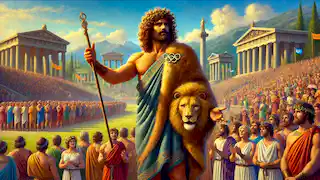In the heart of ancient Greece, where the gods ruled from their thrones atop Mount Olympus, there lived a hero known for his unmatched strength and indomitable spirit. This hero, Heracles, was the son of Zeus, the king of the gods, and a mortal woman named Alcmene. His life was marked by extraordinary feats, known as the Twelve Labors, which tested the limits of his strength, courage, and cunning. Yet, among his many achievements, one stands out as a lasting legacy to the world: the founding of the Olympic Games.
The tale begins after Heracles had completed the Twelve Labors, a series of challenges imposed upon him as a form of penance. With each labor, he had faced and overcome formidable beasts and impossible tasks, earning a place among the greatest heroes of Greece. However, Heracles sought to do more than merely achieve glory; he wished to create something that would bring lasting peace and unity to the people of Greece.
Inspired by a vision granted to him by his divine father, Zeus, Heracles conceived the idea of a great athletic festival. This festival would honor the gods and serve as a peaceful gathering for all Greek city-states, fostering unity and competition in a spirit of friendly rivalry. The location chosen for this grand event was Olympia, a site already sacred to Zeus and known for its majestic temples and statues.
Heracles traveled across Greece, announcing the establishment of the games and inviting all who wished to compete. His charisma and reputation drew athletes from every corner of the Greek world, from the fierce warriors of Sparta to the cultured citizens of Athens. The anticipation grew as the date of the games approached, with each city-state preparing its finest athletes to vie for honor and glory.
The first day of the games arrived, marked by a grand opening ceremony. Heracles stood at the forefront, addressing the assembled crowds and athletes. He proclaimed the start of the Olympic Games and declared the sacred truce, an agreement that all Greek city-states would cease hostilities during the games, ensuring safe passage for participants and spectators alike. This truce, known as the Ekecheiria, became a cornerstone of the Olympic tradition, embodying the values of peace and unity.
The initial event was the stadion race, a sprint covering one stade, approximately 200 meters. The athletes, clad in simple tunics, took their positions at the starting line. The tension was palpable as the signal was given, and the runners sprang forward, their feet pounding the earth in unison. Among them was Echemos, a youth renowned for his speed and agility. The crowd erupted in cheers as Echemos crossed the finish line first, securing the inaugural victory of the games.
The following events showcased a variety of skills and strengths. The pentathlon, a combination of five disciplines, was particularly grueling. It included the discus throw, javelin throw, long jump, wrestling, and a footrace. The athletes demonstrated not only their physical prowess but also their versatility and endurance. In the wrestling competition, the crowd watched in awe as Milo of Croton, a man of immense strength, grappled with his opponents. With his sheer power and skill, Milo emerged victorious, earning the laurel crown, a symbol of honor and victory.
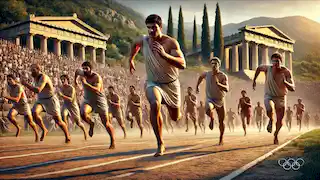
One of the most thrilling spectacles was the chariot race. The track at Olympia was filled with the thunder of hooves as teams of horses, guided by skilled charioteers, raced around the circuit. The air was thick with dust as the chariots sped by, each driver pushing their steeds to the limit. Among the competitors was Pelops, a charioteer of great renown. His mastery over the reins and fearless approach led him to victory, a triumph that was celebrated with great fanfare.
In addition to the athletic contests, the Olympic Games also featured artistic competitions, reflecting the Greek admiration for both physical and intellectual achievements. Musicians and poets gathered to perform in honor of the gods and the heroes. Lyre players strummed intricate melodies, while poets recited odes that extolled the virtues of bravery and honor. These cultural events highlighted the Greek belief in a balanced life, where physical strength and intellectual pursuits were equally valued.
Throughout the duration of the games, sacrifices were made to Zeus and other gods, seeking their favor and blessings. The sacred flame of the Olympic altar burned brightly, a symbol of the divine presence. Heracles, ever the devoted son, made a special offering to Zeus, his father. In response, Zeus sent a sign of his approval—a majestic eagle soaring high above the stadium, a sight that filled the spectators with awe and reverence.
As the games continued, they became a showcase not only of athletic skill but also of the values that Heracles hoped to promote. The spirit of friendly competition prevailed, and the athletes, despite their rivalries, displayed respect and camaraderie. The games were a time when Greeks from different city-states could come together, setting aside their differences in pursuit of excellence.
The final day of the games was marked by the hoplite race, a unique contest in which participants donned full armor and raced to the finish line. The clash of metal and the determined grunts of the runners filled the air as they charged forward, burdened by the weight of their armor. The race was not just a test of speed but also of endurance and discipline. In the end, a soldier from Sparta claimed victory, his rigorous training and unyielding spirit earning him the laurel crown.
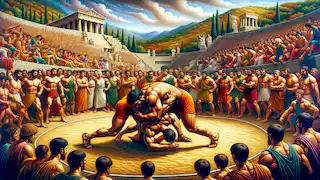
With the conclusion of the competitions, Heracles gathered the athletes and spectators for the closing ceremony. He expressed his pride in the participants and the success of the games. The victors were awarded laurel crowns, made from the sacred olive trees of Olympia, symbolizing their achievement and the honor they brought to their city-states. Heracles' vision had been realized—the games were not just a celebration of physical prowess but a means to promote unity and peace among the Greek people.
In the years that followed, the Olympic Games became a revered tradition, held every four years at Olympia. The sacred truce, which ensured a peaceful environment for the games, became a symbol of the potential for harmony even among warring states. The festival grew in scale and grandeur, attracting participants and spectators from all over the Greek world and beyond.
Heracles' legacy as the founder of the Olympic Games endured long after his death. His name became synonymous with strength, honor, and the pursuit of excellence. The stories of his deeds, including the establishment of the games, were passed down through generations, inspiring countless athletes and citizens to strive for greatness in all aspects of life.
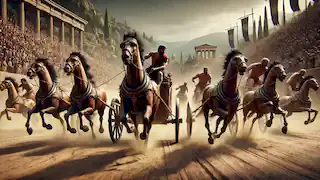
The Olympic Games themselves evolved over time, incorporating new events and traditions. The original competitions, rooted in religious and cultural significance, laid the foundation for what would become one of the most enduring traditions in human history. The spirit of the games, embodying the ideals of fair play, respect, and the celebration of human potential, continued to resonate through the centuries.
As the flames of the Olympic altar flickered and died at the end of each festival, the people of Greece would depart with a renewed sense of unity and purpose. The games reminded them of the shared heritage and values that bound them together, despite the political and social divisions that often separated them. Heracles, the hero who had brought the games into being, was remembered not only for his strength and courage but also for his vision of a world where peace and cooperation could be achieved through shared endeavor.
The story of Heracles and the founding of the Olympic Games is more than a myth; it is a testament to the enduring power of tradition and the human spirit. It speaks to the capacity for individuals to transcend their differences and come together in pursuit of common goals. Through the games, Heracles left a lasting legacy, one that continues to inspire people around the world to this day.
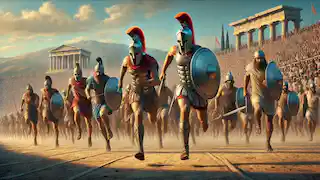
And so, every four years, as athletes from across the globe gather to compete in the modern Olympic Games, they carry with them the spirit of Heracles and the ancient festival he founded. The Olympic flame, a symbol of peace and unity, is lit once more, and the world watches as the best and brightest showcase their talents and dedication. The legacy of Heracles, the hero who dreamed of a festival to unite all Greeks, lives on in this global celebration of excellence and friendship.
Thus, the story of Heracles and the Olympic Games remains a shining example of the values that can unite us all—strength, honor, and the pursuit of a better world. It is a story that continues to be told and celebrated, reminding us of the power of tradition and the enduring spirit of the human race.
